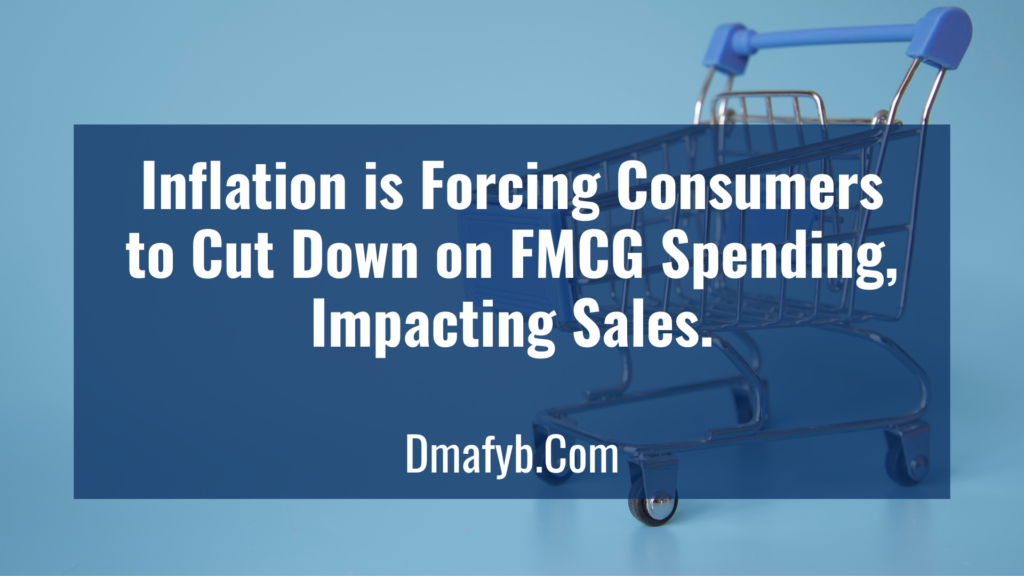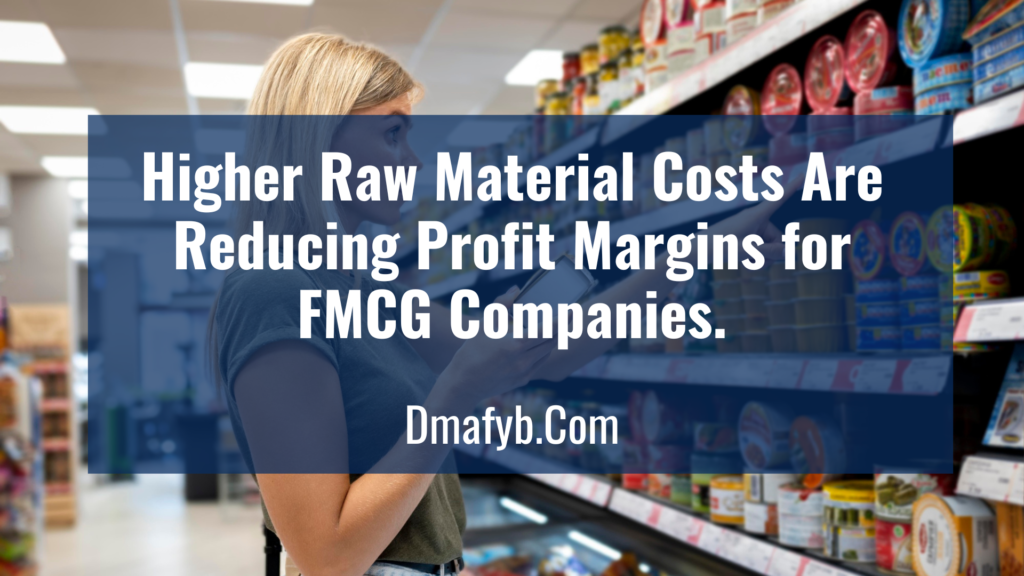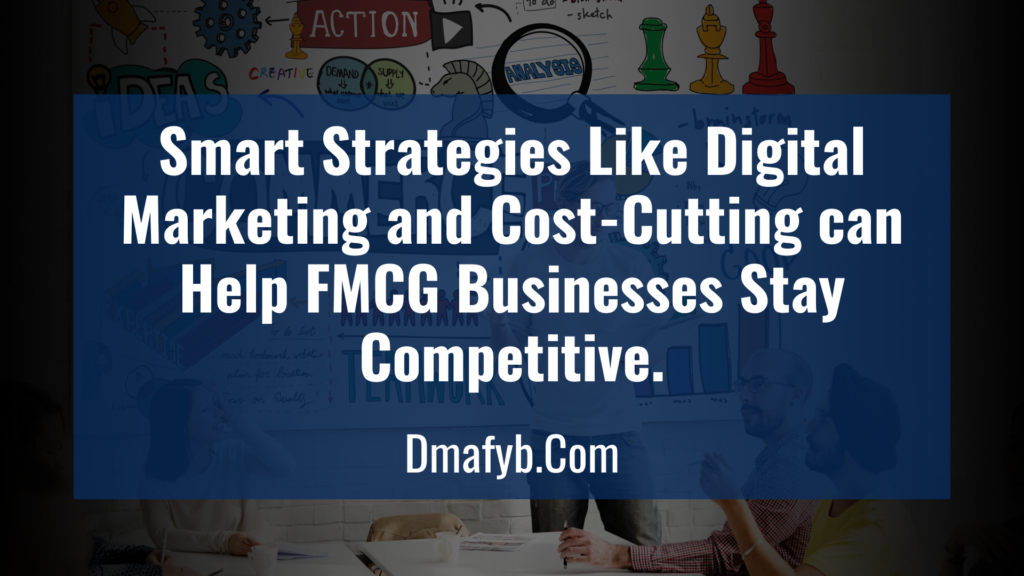If You’ve Been Following The Stock Market You May Have Noticed that FMCG (Fast Moving Consumer Goods ) Stocks have been Declining Recently. This Might Seem Surprising, especially since the FMCG Sector Is known for Its Stability Even during Economic Downturns. but As With Any Industry Market conditions consumer behavior and external factors play a big role in stock performance.

Why Should You pay Attention to this Trend?
Whether you’re an investor looking to make informed decisions or an Fmcg Manufacturers Owner Navigation market uncertainties, understanding this trend is crucial. A falling stock price doesn’t just affect investors it can also indicate deeper industry challenges like shifting consumer demand rising production costs or competitive pressures.
In This Blog We’ll Break Things Down Step by step:
Whats Causing the Decline in FMCG Stocks?
how Does This Impact FMCG Companies and Business owners?
What Strategies can Help Businesses stay strong during this Downturn?
By The End of this Blog You’ll Have a Clear Understanding of not just why FMCG Stocks are falling But also How to Solve These Issues. So Let’s Get Started!
key Reasons Behind the decline In FMCG Stocks
1. Declining Consumer Demand Among Inflation
One of the Biggest Reasons for the Decline in FMCG stocks Is Weak Consumer demand. inflation has led to a rise in the cost of living which means consumers are now more cautious about their spending.

Urban Households Are cutting back On Discretionary FMCG Products as Their Expenses on essentials like rent and fuel have increased.
As a Result, Companies are Struggling to maintain their sales volume directly impacting their stock performance.
2. Rising Row Material Costs Eroding profile Margins
Another Major Factor affecting FMCG Companies is the rising Cost Of raw materials. for Example:
Palm oil Prices, a Key Ingredient in soaps and packaged foods have surged 20_30% year on year, making production more expensive.

Plastic And packaging costs have increased impacting margins for companies selling bottled beverages and packaged snacks.
Since Most FMCG Companies operate on this Margins Any increase in production costs directly eats into their profitability leading to weaker earning reports and declining stock price.
3. Foreign investor sell off due to economic concerns
Global economic uncertainty has led to a massive sell off by foreign portfolio investors (FPIs). In just the first half of March fpis withdrew$3.5 billion from Indian markets with a major chunk coming from the IT and consumer Sectors.
Why are Foreign investors pulling out?
Concerns over a potential economic slowdown in the U.S and india.
Rising Interest Rates Globally makes safer assets more attractive than stock market investments.
4. Intensifying Competition from Regional Brands
The COVID 19 Pandemic disrupted global supply chains but it also created an opportunity for regional brands to expand. Many FMCG companies have now captured share by offering:
Affordable Pricing Appeals to price-sensitive consumers.
Localized Production reduces dependency on expensive imports.
Stronger distribution networks ensure availability even in remote areas.
Established FMCG Giants now Face Stiff competition forcing them to either lower prices (Reducing profits) or invest more in marketing (increasing costs). Both scenarios negativity affect stock performance.
5. Regulatory Challenges And Compliance Costs
FMCG Companies as long have to navigate an increasingly complex regulatory environment. New government policies related to:
Product Labeling
Sustainability Requirements
Higher taxation on certain FMCG Goods
These Regulations increase compliance costs for companies further Reduced their profits.
6. Weak Financial Results Affecting Investors’ Confidence
One Of The Biggest Reasons For the Recent decline in FMCG stock is disappointing earnings reports. Many top FMCG companies have reported lower than expected revenue and profits growth causing investors to lose confidence.

One of the biggest reasons for the recent decline in FMCG stocks is disappointing earnings reports. Many top FMCG companies have reported lower-than-expected revenue and profit growth, causing investors to lose confidence.
For example:
Companies that used to grow at double-digit rates are now showing single-digit growth.
Higher operational costs are reducing profit margins even if sales numbers remain stable.
When Earning reports are weak, stock prices tend to fall because investors see less potential for future growth.
Impact of Stock Decline on FMCG Manufacturing Owners
FMCG Stock prices may seem like just numbers on a screen but their decline has real consequences especially for business owners Whether you run a mid-size FMCG company or a small manufacturing units a falling stocks market can impact your growth profitability and future plans. Let’s break it down.

Assessing the Direct Vs Indirect Effects
Direct Impact:
A Company’s stock value plays a big role in its ability to raise funds. When share prices drop, it becomes harder to secure investments for expansion marketing or innovation.
Indirect impact:
Falling stocks can lower consumer and investor confidence, making customers more cautious about spending and businesses more reluctant to take risks.
If a leading FMCG company’s stock falls significantly, lenders and financial institutions might hesitate to offer loans. and Reduce their own prices Maintain prices but lose customers to the bigger brand. Expansion plans get delayed R&D Budgets shrink and marketing spends are cut. Over time this affects not just the company but the entire supply chain, right down to small retailers.
Increased Competition :
When Big FMCG Brands struggle with falling stocks, they might lower prices to attract more customers. This puts pressure on smaller manufacturers who can’t afford deep discounts.
Squeezed profit margins:
With Rising Raw materials costs and higher operational expenses small businesses already operate on this margins. A Decline in FMCG stocks may push larger retailers to demand better deals further shrinking profitability.
Limited Access To Funding:
Investors and Banks may hesitate to fund smaller brands, fearing instability in the FMCG sector. This makes it tough for mid-sized businesses to expand, launch new products or even sustain existing operations.
So, what’s the way forward? Business owners need to focus on cost efficiency, explore digital marketing and build direct consumer Relationships to stay competitive during tough times.
The market is uncertain but smart businesses don’t just survive; they adapt and Sucess.
Strategies For FMCG Business Owners to Navigate the Downturn
THE FMCG Industry is facing turbulence, but challenges always come with opportunities. If your business is feelingthe impact of stock market fluctuations it’s time to rethink strategies and adapt. Here’s how you can stay strong and grow despite market uncertainties.
Strengthening Brand Presence and Consumer Trust
When Markets are unstable trust becomes your biggest asset. Consumers tend to stick with brands they believe in, especially during uncertain times.

Invest in consistent branding across all platforms social media packaging and advertisements.
Highlight Your Product quality heritage and values to create a deeper emotional connection.
Engage with your customers through storytelling behind the scence content and testimonials.
If You’re an FMCG Business Owners focus on cost management explore digital marketing strategies and keep an eye on changing consumer behavior to stay ahead of competition.
A strong Brand Presence Ensures that even If Competition intensifies your loyal customers won’t switch easily.
Embracing Digital transformation and direct-to-consumer models
Retail Store Sales May Fluctuate but digital platforms are growing rapidly. Now Is the Time To Strengthen your Online Presence.
List Your product on Amazon Flipkart Bigbasket and other e Commerce platforms.
Build Your Own Direct-to-Consumer D2C Website to sl directly and reduce Dependence on retailers.
Use Targeted Social media ads To reach specific customer groups and increase sales.
Digital marketing and D2C Models give you greater control over pricing branding and customers relationships.
Optimizing Supply Chain Efficiency
Rising Raw Material Cost And Supply chain Disruptions Can eat into profits. Optimizing operations is key to survival.
Negotiate better Deals with suppliers To Reduce procurement costs.
USE local Sourcing to cut Down On logistics ecpenses.
Adopt inventory management tools to prevent overstocking or understocking.
A Lean Efficient supply chain Keeps Costs in Check and helps Your Business stay competitive.
Diversifying product Portfolios
Consumer preferences are evolving. If Your Product range isn’t keeping up now is the time to innovate.
Introduce health conscious options like organic, gluten free or sugar free products.
Convert into trending categories like plant based food sustainable packaging and ayurvedic Wellness.
Offer budget friendly alternatives to attract cost-conscious customers.
A diversified product range ensures you stay relevant and attract new customers. Even when market trends shift.
Focusing on Customer Engagement and Loyalty Programs
Retaining existing customers is always cheaper than acquiring new ones. Strengthen customer relationships with:
Loyalty programs offering discounts cashback or rewards.
Personalized marketing through emails SMS And WhatsApp Updates.
Interactive campaigns like Contents referral bonuses and community-driven initiatives.
Happy Customers Dont just return They become brand advocates helping you grow organically.
Conclusion
Yes, The FMCG Market Is Facing challenges. but Businesses that adapt innovate and focus on customers trust will not only success but grow. this Downturn is Temporary but smart strategies create long-term Sucess.
FMCG Stocks Are Facing a decline due to multiple factors rising raw materials cost lower customer demand intense competition and regulatory challenges these challenges have made it harder for companies to maintain their profit margins and investors confidence.
But Tough Times also Bring New Opportunities. Business owners who act strategically can minimize risks and even find ways to grow. Strengthening brands trust improving supply chains, embracing digital transformation and diversifying product portfolios can make a big difference.
Instead of panicking over market fluctuations, focus on long term market strategies. adapt to changing customer needs optimize operations and invest in innovation. the FMCG industry Will keep Evolving those who stay flexible and proactive will come out stronger.
If you need free Digital marketing Strategy consulting for your FMCG brand then you can contact us. and also read this.
